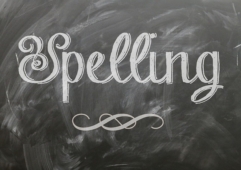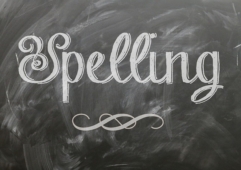 English spelling is so crazy and I am constantly apologizing to my students for this. While there are reasons for why it turned out like this. there are ongoing attempts to standardize the spelling, none of which have worked to date.
English spelling is so crazy and I am constantly apologizing to my students for this. While there are reasons for why it turned out like this. there are ongoing attempts to standardize the spelling, none of which have worked to date.
It seems now there is, once more, a new initiative to standardize spelling. It is certainly not an easy task – a little like moving from the imperial system of measurement to the metric system; we did this a number of years ago but I still think in pounds. Changing the spelling of words would be a much more momentous task. Let’s see how it works out.
English spellings don’t match the sounds they are supposed to represent. It’s time to change
You can’t tell the spelling from the pronunciation, and you can’t tell the pronunciation from the spelling. No wonder people find English difficult
If you set out to create the most complicated spelling system in the world, then you could hardly do better than English.
English spelling was messed about with in the 15th century when it became reinstated as our official language. Foreign printers with imperfect knowledge of English compounded the felony during the Bible wars of the 16th century, and the early lexicographers made little attempt to match spellings consistently with the sounds they were supposed to represent. Not much has changed since then – which seems unbelievable when you consider what a forward-thinking and innovative nation we are.
The Guardian’s recent style change in adopting American spellings when referring to specific American placenames such as One World Trade Center excited much debate among the members of the English Spelling Society: some wondered if this was at long last a first step towards reforming English spelling – one of the most difficult orthographies in the world.
Consider the pronunciation of sound, southern and soup (ou) or blue, shoe, flew, through, you, two, too, gnu (oo): the spellings for identical sounds have ended up exceptionally varied. And the other side of the coin is that one letter combination can represent more than one sound (ei – weird, receive; ou – loud, should; ie – believe, tried). Not only is it often difficult to predict the spelling from the pronunciation, you can’t always tell the pronunciation from the spelling – this is the “double whammy” of English spelling.


English Spelling… in the Guardian article, there is reference made to “Maternal English speakers”. I have never heard the expression. What exactly is that? Those whose native tongue is English?
It is an interesting concept but I’m uncertain how I feel about taking away the variety and texture of the language and its spelling. How far will it be taken? Will ‘though’ become ‘tho’?? I feel kind of sad about it too.
“Maternal language” is the same as “native language” from what I understand. And hard to say how far it will go. Change is hard! Remember moving from Fahrenheit to Centigrade? I get the sentiment though! 🙂